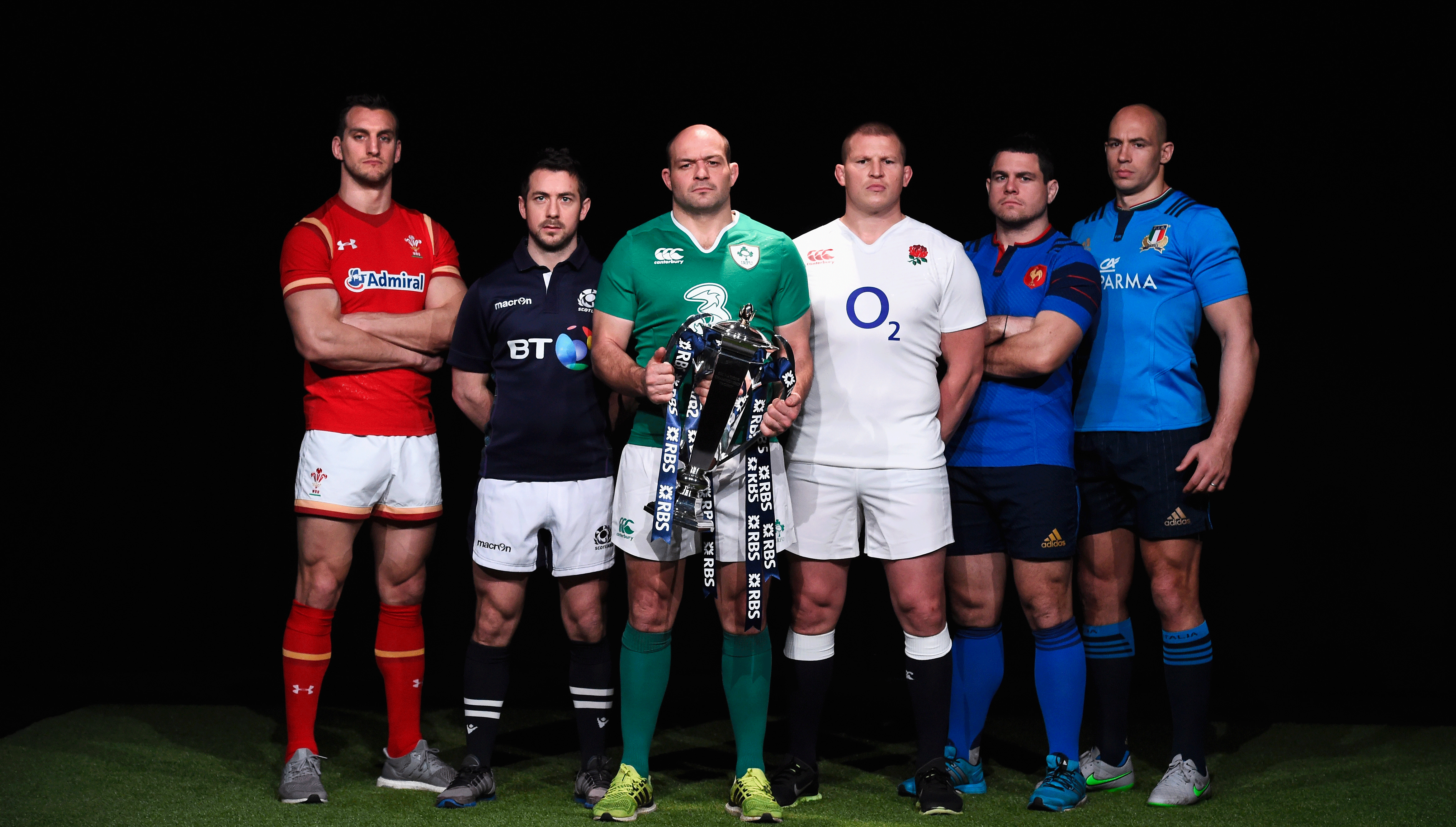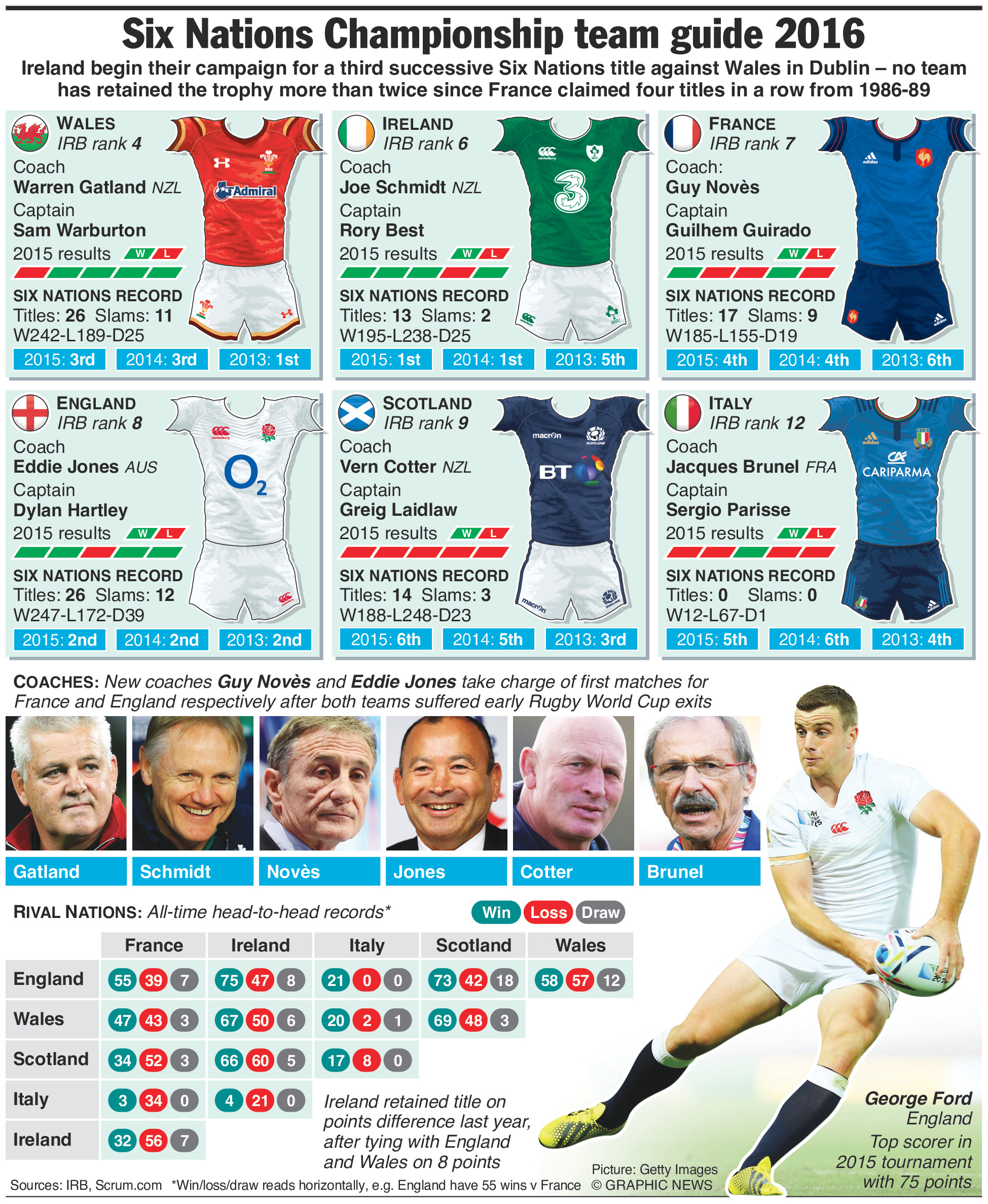
Interest in northern hemisphere rugby can be distinctly polarising. The sport is largely confined to the western corner of Europe, and without the global appeal of football, it suffers from neglect outside the British Isles and France. The European Cup used to be a real draw to the wider audience but the politicking, egotism and greed of the wealthy French and English clubs have rendered that a dwindling force.
The Six Nations remains the crown jewel in the northern hemisphere’s season. For two months, rugby in the northern hemisphere enjoys a spike in support. The tribalism of the tournament, where nations face off against their nearest neighbours on a weekly basis, and the timeframe in which it is completed, heightens interest.
Just months after a World Cup held on English soil failed to produce a single northern hemisphere semi-finalist, there have been plenty of calls for the Six Nations sides to abandon their standard approach and follow the attacking template offered by their southern hemisphere counterparts.

So what can we expect of the 2016 Six Nations? Will this be the tournament where outside backs thrive with a surfeit of possession? Don’t count on it.
To suggest there will be a major change in style across the board would be flippant, yet there may be some shoots of change afoot. Should Warren Gatland and Joe Schmidt, the pragmatic Kiwi head coaches of pre-tournament favourites Wales and Ireland, cast their minds back to last year’s concluding day of the competition, they may consider that free-flowing rugby can be as effective in achieving results, as is it aesthetically pleasing for the spectators.
Both sides threw off the shackles and produced the most scintillating running rugby the tournament had seen in years. Wales ran in eight tries against Italy in Rome, having mustered up a meagre five in their previous four fixtures, while Ireland followed that up by crossing for four against the Scots having registered a paltry total of three (excluding a penalty try against Wales) in their other games.
Here, Sport360 previews each team’s chance of glory in the Six Nations.
WALES
COACH: Warren Gatland
CAPTAIN: Sam Warburton
Gatland favours a physical, forward-orientated style of play and that won’t change because the public will for it to. Wales had the toughest run of fixtures of any team that made the knockout stages of the World Cup, playing England, Fiji and Australia consecutively in the space of 15 days. Besieged with injuries, the Welsh ran out of steam when narrowly defeated in the last eight by a Springbok team who emerged from a much less daunting and physically demanding pool.
With a wealth of backs including Jonathan Davies and Liam Williams returning from injury, Wales have the threatening game changers they lacked across the backline during the autumn.
KEY MAN: Jamie Roberts. Getting the ball to the centre, and dominating the gainline are the essential parts of Gatland’s gameplan.
PREDICTED FINISH: 1st. Wales were the most impressive of the Six Nations sides at the World Cup, despite playing with one hand tied behind their back due to injuries.
IRELAND
COACH: Joe Schmidt
CAPTAIN: Rory Best
Ireland enter the tournament looking to win an unprecedented third Six Nations crown in a row, having claimed the titles in 2014 and 2015 on points difference. Last year, the team copped considerable slack for their painstaking safety first approach but they were trying to bed in a new midfield partnership of international novices with a combined eight caps before the tournament.
Neither Robbie Henshaw (12) or Jared Payne (13) were regulars for their provinces in those positions, while Schmidt was also deprived of the nation’s best finishing winger Keith Earls due to injury. With abundant backline options now available, and those men in great form for their provinces, Ireland could now be in a position to develop the attacking side of their game.
KEY MAN: Sean O’Brien. The Leinster flanker is Ireland’s major carrying threat, while his workload at the breakdown will increase in Peter O’Mahony’s absence.
PREDICTED FINISH: 3rd. Ireland have struggled for tries over the past two campaigns, opponents may be sussing them out and they don’t seem to have enough creative flair individually to open defences.
ENGLAND
COACH: Eddie Jones
CAPTAIN: Dylan Hartley
England have revamped their uninspiring backroom team with an imaginative head coach who has proven his ability to oversee entertaining rugby that delivers success. Eddie Jones has cast aside a high proportion of the old guard and included an eclectic mix of enthusiastic and exciting international rookies.
If Jones can get England to play with the vim and vigour of his Japan side, they could be on course to claim a first title triumph since 2011. With attacking options such as Jonathan Jospeh, Elliot Daly and Anthony Watson, England could carve rather than bludgeon their way to the top of tree once more. Spearheaded by Saracens famed defence coach Paul Gustard, they should be equally adept at keeping the tries out at their own end.
KEY MAN: Jonathan Joseph. Eddie Jones has already stated his priority is getting England to dominate up front, but in Joseph they have a player who can create magic from nothing.
PREDICTED FINISH: 2nd. Home games with Ireland and Wales plus the “new manager bounce” effect should see England challenging for honours in this campaign.
SCOTLAND
COACH: Vern Cotter
CAPTAIN: Greg Laidlaw
Having finished the 2015 Six Nations with a wooden spoon that included a home defeat to the Italians, few would have expected Scotland to end up coming closer to a World Cup semi-final spot than any of the other northern hemisphere nations.
But in Vern Cotter they do have a hardened, no nonsense coach, whose years of success with Clermont were starting to shine through in the autumn, and for the first time in over a decade Scottish supporters will be entering this tournament harbouring thoughts of success. Cotter has enlisted the help of a specialist “breakdown coach” and is clearly targeting an area of the field that has become increasingly important. Coupled with the presence of fellow Kiwi John Hardie in the back row, Scotland could the primed to launch their talented Glasgow backs on the tournament.
KEY MAN: John Hardie. The openside has the potential to stifle any team in the competition with his ferocious work ethic at the breakdown.
PREDICTED FINISH: 4th. Scotland are improving under Cotter, but they still lag a bit behind the top trio in this competition.
FRANCE
COACH: Guy Noves
CAPTAIN: Guilhem Guirado
If Eddie Jones’ appointment as new English head coach has garnered reams of media attention, the appointment of the new French head coach Guy Noves has been much less heralded. An institution in Toulouse, where he hoovered up accolades like dust mites – winning four European Cups, and 10 French championships, Noves has already promised to return the French to their swashbuckling ways of old.
It will take something special to eradicate memories of the ill-fated reigns of Marc Lievremont and Philippe Saint Andre, but with a fresh, vibrant squad selected, Les Bleus will almost certainly entertain again, even if this tournament may be too soon to challenge for ultimate honours.
KEY MAN: Guilhem Guirado. A lot of France’s senior players have departed the scene so the hooker must take up the leadership reigns with gusto.
PREDICTED FINISH: 5th. Guy Noves will be trying to bed in a number international novices, without gaining unlimited access to the squad during the tournament.
ITALY
COACH: Jacques Brunel
CAPTAIN: Sergio Parisee
The hapless Azzurri continue to have their place in the competition questioned, as they have yet to present a serious challenge since they were welcomed into the then-Five Nations in 2000. Italy have finished rock bottom 10 times in 16 years to date. Their club game is in disarray, they still haven’t found an out half that can control a game or kick penalties and they are openly advertising their head coaching job, despite the fact Jacques Brunel remains in situ.
Moreover, the day Sergio Parisse finally hangs up his boots is looming like Armageddon for this squad; Italy’s only world-class operator may not have long left in the tank, and he is the only thing that keeps them suitably competitive. How Parisse must have viewed the World Cup in disillusionment as the country of his birth – Argentina – cut a swathe through the world game as he laboured with a distinctly second- tier team.
KEY MAN: Sergio Parisse. The captain is Italy’s best, and only, world class player.
PREDICTED FINISH: 6th. Their best players are getting older, and with no capable replacements in reserve, the plus 30 brigade must soldier on through adversity.